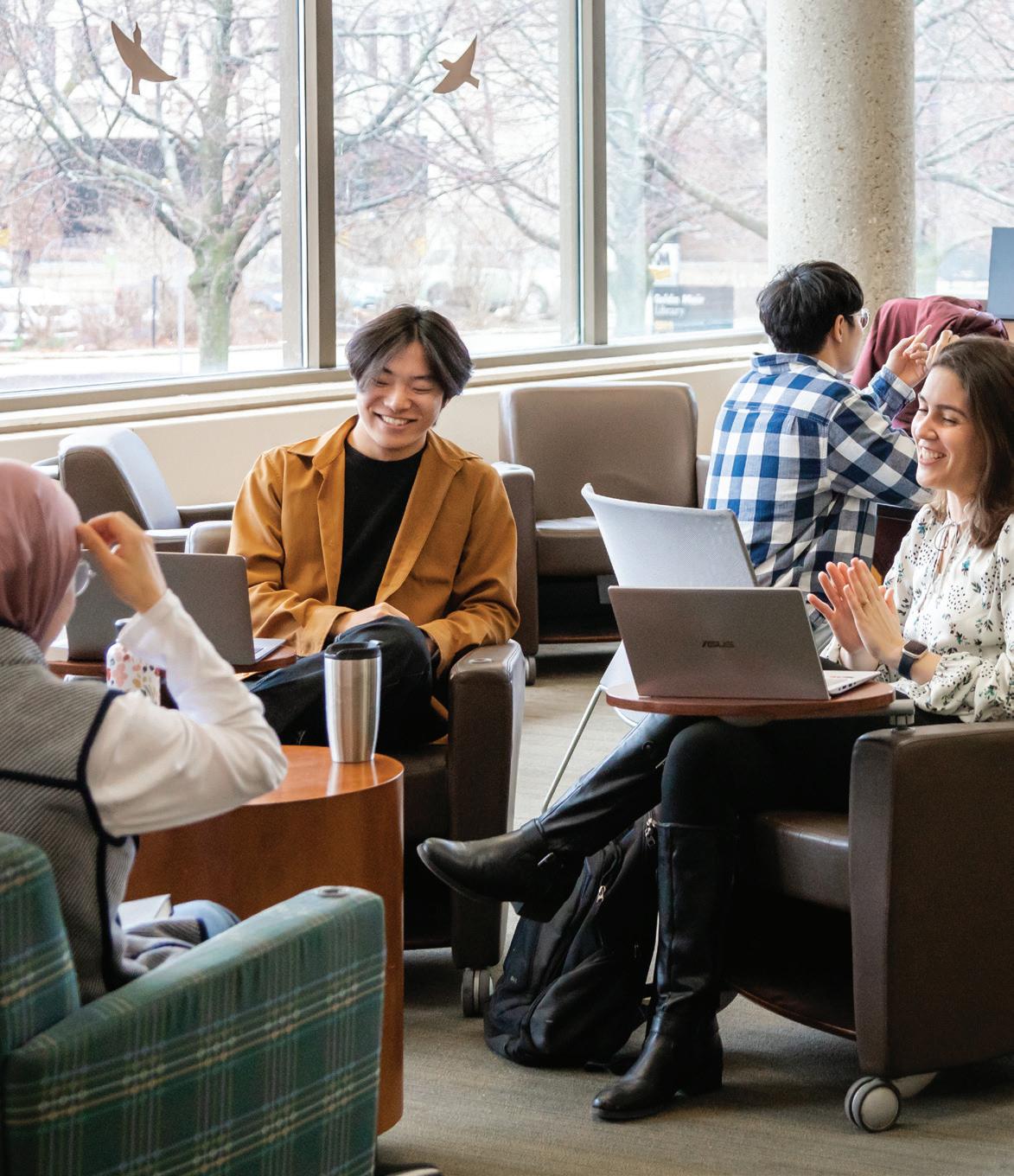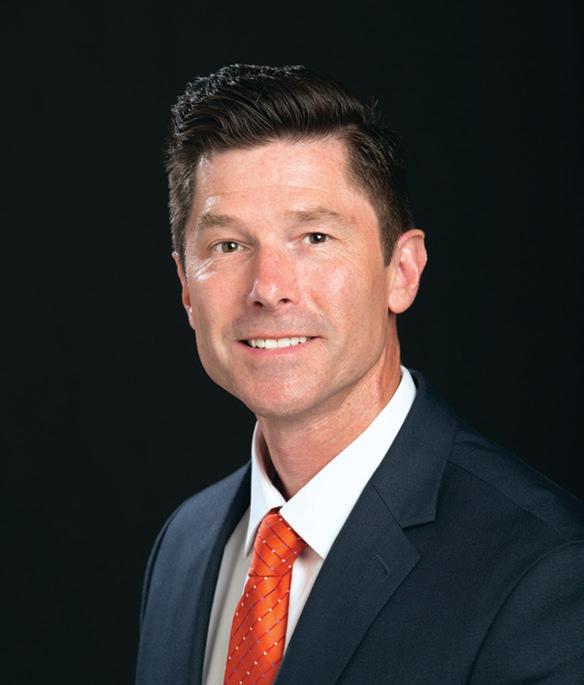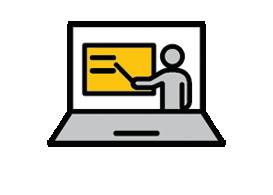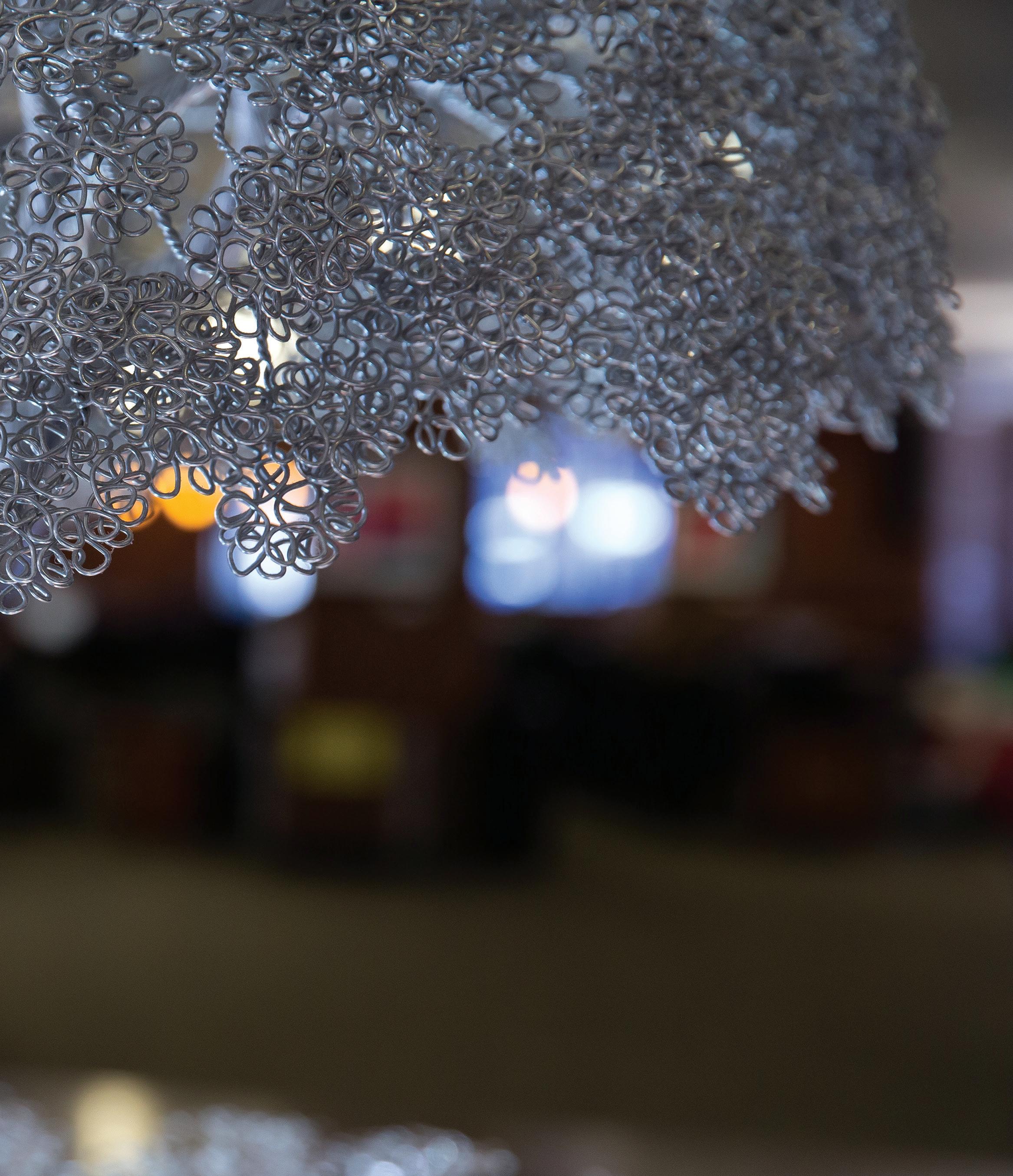





The 2022-23 academic year ended on a high note with the graduation of nearly 3,400 undergraduate and graduate students, many of whom will stay in southeastern Wisconsin and make contributions to the economy of the State. Our students deserve tremendous applause for their accomplishment – and their academic persistence, overcoming the numerous challenges presented by the COVID-19 pandemic.
Michael Doylen, Associate Vice Provost and Director of Libraries
These students have been supported by everyone at UWM, including the UWM Libraries. Librarians teach students the critical thinking skills necessary for them to function effectively in a society that runs on information and in which misinformation and disinformation is ubiquitous.
We provide them with the resources, print and digital, needed for thoughtful participation in professional and scholarly discussions on current affairs and cutting-edge research.
And we furnish them with the physical spaces they require to engage in quiet study and group work. Congratulations to the class of 2022-23!
This year the UWM Libraries had several accomplishments and milestones whose stories are told in the pages that follow. Here is a glimpse of them –
• We completed the construction phase of the Archives renovation project! Construction began in November 2021 and we will open the space to students, faculty, and others by the start of the fall semester.
• Through the Open Textbook Project, students in Psychology 101 have saved over $2 million in textbook costs since 2016. The project is coordinated by the Libraries and the Center for Excellence in Teaching and Learning.
• We entered several “transformative agreements” with scholarly publishers that support open access publishing by UWM authors and remove costs associated with article processing charges. We look forward to building on these successes and welcoming the class of 2023-24 to UWM in the fall.
Michael Doylen, Ph.D., M.L.I.S.This summer the UWM Libraries completed a major renovation on the third floor of the Golda Meir Library for the Archives Department. The Archives will offer all of its teaching and research services at its location by the start of the fall semester.


The beautiful, contemporary spaces facilitate the campus and the community’s engagement with Archives collections. They include a dedicated classroom, spacious reading room, exhibit cases and more. Climate-controlled storage supports the long-term preservation of valuable, fragile documents, photographs, films, and other materials.

The $2.8 million project was funded by an anonymous $1 million donation along with additional monies from the State and private donors.
The Archives focus on documenting the history of UWM and providing access to primary sources,
largely from the metropolitan Milwaukee area, that have long-term research and instructional value.
Collection strengths pertain to social justice, underrepresented populations, LGBT communities, and the Milwaukee brewing industry.
Significant individual collections include the WTMJ-TV news film archive, Roman B.J. Kwasniewski photographs, and the editorial files of the Little Review magazine.
The Archives’ collections are an indispensable source of information for local history projects, from magazine articles to scholarly books and documentary films. Additionally, archivists provide course-integrated instruction to students from UWM and other local colleges and universities, teaching critical thinking skills about the past and historical sources.

The UWM Libraries hosted a celebration on March 9 recognizing UWM faculty and staff who have published books or recordings within the last two years. Chancellor Mark Mone praised the efforts of the 67 authors and their cumulative 84 works, which were on display at the event held in the Golda Meir Library’s fourth floor Conference Center. Interim Provost Scott Gronert and Libraries Director Michael Doylen also spoke.
Works published by the authors represented a wide variety of disciplines–from administrative leadership to materials science & engineering to history–and in many genres–biography, textbook, scientific treatise, poetry, translation, and more.
The UWM Authors Collection was established in 1973 to bring together as complete a collection as possible of monographs and audio and visual recordings produced by UWM faculty and staff in order to better document the university’s research outcomes. The first Authors Recognition Ceremony was held in 1992; this most recent event was the 16th.
The collection now numbers 3,438 works. It is displayed in the Special Collections Reading Room of the Golda Meir Library. A selection of recently published books by UWM authors is available in the UWM Authors Browsing Collection located next to the Grind in the Daniel M. Soref Learning Commons.
This year the Psychology 101 course at UWM surpassed $2 million in savings for students since adopting an open textbook in 2016, OpenStax Psychology. The course was the first at UWM to participate in the Open Textbook and Open Educational Access/Resources project led by the Libraries and the Center for Excellence in Teaching and Learning (CETL). The program continues to grow: 26 UWM courses used open or affordable materials in fall 2022, with a total of more than $3.5 million in student savings.

As an incentive for faculty to adopt open textbooks, the project offers grants. Funding has been used to hire graduate student assistants for the summer term, compensate editors or purchase a laptop to aid in editing and producing open educational resources.
The Libraries and CETL offer UWM instructors self-paced, online training for open textbooks, open educational resources, and affordable content for their courses. This training explains the benefits of affordable course materials for UWM students, and provides the tools to support the identification of high-quality open textbooks and open educational resources, as well as just-in-time resources to address copyright and fair-use considerations for educational content.
In fall 2022 the Archives acquired a box of letters and documents belonging to Herman Weil (1905-1995), a former UWM professor and founder of the Honors College. Weil was a Holocaust survivor and many of the letters in this collection relate to his prolonged attempt to have his in-laws transferred out of the Nazi death camps.
A native of Alsace-Lorraine, Weil earned a doctor of psychology degree at the University of Marburg in Germany and worked with the prominent philosophertheologian Martin Buber in Frankfurt. He was briefly imprisoned at the Buchenwald concentration camp in 1938 and emigrated to the United States after his release.
Weil joined the Milwaukee State Teachers College, a predecessor of UWM, in 1943. He was the first chair of the UWM Psychology Department and served as the first director of the Honors College. He specialized in the psychology of prejudice, and was well known for his work in intergroup relations and human rights. He retired from UWM in 1976 and was awarded an honorary doctor of public service degree from the university in 1986. A leader in the Milwaukee Jewish community, Weil also received the Interfaith Award of the Milwaukee B’nai B’rith Council and the Wisconsin Brotherhood Award of the National Conference of Christians and Jews.

The Archives already owned scrapbooks covering his UWM career. This new donation focuses on his personal life–his letters (one a typewritten note from Albert Einstein) and several documents from the Nazi regime including Weil’s identification card from Buchenwald.

Digital Collections has digitized 400 of his letters written in German to his family members. The next step is translation of the letters by students in the Foreign Languages and Literature program, which is being organized and funded by the UWM Stahl Center for Jewish Studies.
“We are very excited about this acquisition,” says Derek Webb, head of the Archives, “and thrilled as well to be collaborating with Rachel Baum at the Stahl Center and UWM language students in creating a digital collection that will facilitate other projects and uses of the Herman Weil Collection.”
 The Ivy 1955 Yearbook, Wisconsin State College, Milwaukee.
The Ivy 1955 Yearbook, Wisconsin State College, Milwaukee.

The Libraries added a number of important digital resources during the past year, including:



Mango Languages, an online language learning platform that offers courses in over 75 languages, including English as a second language. It provides an easy-to-use mobile app, making language learning accessible 24-7.
Visible Body Suite, an interactive 3D anatomy tool that includes a human anatomy atlas, comprehensive references for biological concepts and processes, and detailed animations. Acquired via a three-year license, Visible Body Suite provides access to five different apps: Human Anatomy Atlas, Visible Biology, Anatomy & Physiology, Muscle Premium, and Physiology Animations.
America: History and Life, the definitive research database covering the history and culture of the United States and Canada from prehistory to the present. It includes hundreds of full-text history journals, plus useful features such as the ability to search by time period.
Access to over 11,000 Cambridge University Press ebooks via a one-year evidence-based acquisitions (EBA) agreement. These ebooks range in primary subjects such as anthropology, chemistry, engineering, geography, literature, medicine, and many other subject areas.
Access to Exploring Race in Society. This database is designed for students and faculty at the high school and college level to support dialogue on the key issues surrounding systemic racism.

The authors of a newly published book, Telling Our Stories: A History of Diversity at the University of WisconsinMilwaukee, 1956-2022, relied heavily on the collections and staff of the UWM Archives.
The book chronicles the contributions of the diverse voices and communities that have enriched the university since its founding. It was edited by Chia Youyee Vang, UWM vice chancellor for diversity, equity and inclusion and professor of history, and David J. Pate, Jr., associate professor and chair of the UWM
Department of Social Work. Twenty-two current and former UWM faculty and staff contributed essays.
Archivists supported the authors by recommending specific collections to research, and provided access to records, which ranged from those of the Office of the Chancellor to the UWM Post, a student newspaper.
Reference and Instruction Archivist
Abigail Nye says the variety of resources was important: “When we tell history, it’s essential to put different voices in
(Above) Archives staff who assisted Telling Our Stories’ authors conduct research included, from left, Derek Webb, head of Archives; Jamee Pritchard, graduate intern; and Abigail Nye, reference and instruction archivist.

conversation with each other. Narrating a story of diversity at UWM must include the voices of students, faculty, staff, and the wider community.”
Many more Archives records were explored. Here is a sampling: UWM Photographic Services, LGBT Resource Center, Equal Opportunity Office, Roberto Hernandez Center, Student Affairs Office of the Assistant Chancellor, Office of the Dean of Students, and Faculty and Staff Biographical Files.
Both librarians and researchers made many interesting, and sometimes amusing, discoveries during the project. For example, Nye says, “we learned that the UWM Children’s Center was the brainchild of SHREW: Sisters Hellbenton Relevant Educational Welfare.”

The project was mutually helpful in other ways. “Chia Vang, who co-wrote the chapter, ‘Asian Americans: A Force for Diversity, Scholarly Contributions, and Innovation,’ plans to donate oral histories she conducted for her research to the Archives,” Nye says.
Researchers were able to offer more finding terms to be added to the Archives finding aids, enriching future scholarship. And the research done on veterans and Southeast Asian students revealed gaps in the Archives’ collections that will be filled, says Derek Webb, head of Archives.
UWM Chancellor Mark Mone hosted a book launch of Telling Our Stories on September 27 in the Golda Meir Library, with over 200 guests celebrating the editors and authors.
 (Above, left) Protester speaks with police officer at occupation of Chancellor’s office during August 1970 demonstrations leading to the establishment of the Spanish Speaking Outreach Institute at UWM.
(Above, right) Cover of the manifesto of the Gay Liberation Organization, the first gay and lesbian student organization at UWM, 1970.
(Above, left) Protester speaks with police officer at occupation of Chancellor’s office during August 1970 demonstrations leading to the establishment of the Spanish Speaking Outreach Institute at UWM.
(Above, right) Cover of the manifesto of the Gay Liberation Organization, the first gay and lesbian student organization at UWM, 1970.
“UWM Creates,” a retrospective of student, alumni and faculty-created artwork spanning nearly 65 years from Special Collections and the UWM Union Art Gallery Art Collection, was on view in the Fourth Floor Exhibition Gallery of the Golda Meir Library in the fall.

“Through artists’ books and other media, these UWM artists grappled with a wide variety of themes, creating a visual map of UWM art interest over the years.” says Max Yela, head of Special Collections.
Some works featured collaborations between students, faculty, and community members, highlighting the various artistic relationships that have come from the University—relationships that persist long after these initial works.
“This UWM tradition of integrative making has encouraged new and diverse ways of thinking, a tradition that will continue for the next generations of makers,” says Yela.
The exhibition not only emphasized the work of students and alumni, but it also offered current students
an opportunity to practice skills and techniques that prepared them for professional life.
“Our graduate intern Teddy Lepley III was co-curator for the exhibition,” Yela says. “Teddy is an Art & Design grad student focusing on printmaking and artists’ books, but he also maintains a strong interest in curation, gallery installation, and art education.”
Lepley was responsible for making selections from Special Collections, research and writing, and designing and installing the exhibition. His co-curator Emily Hankins is the former student director of the UWM Union Art Gallery and an art history graduate alumna. She was responsible for curating a selection of materials from the Union Gallery’s permanent collection for the exhibition.
The experience offered both of them valuable lessons in cooperative curatorial practice, Yela says. Today, Emily is professionally employed as the registrar for The Warehouse Art Museum in Milwaukee.
Library staff at Washington County and at Waukesha oversaw the creation of pollinator gardens outside their respective buildings this past year, engaging students and staff, and beautifying the exterior spaces.

At Washington County, students from the Environmentalist Club with assistance from the campus maintenance department, cleared several tons of landscaping rocks from the existing bed in October and planted native wildflower seeds in the greenhouse. In the spring they refilled the garden with topsoil and sand, transplanted the seedlings, and added a bee house and compost bin.
At Waukesha, the library looked to the Gardening Club to replant a garden near its entrance. With recommendations from a master gardener from the Waukesha County Extension and tools from the biology department, the club members rebuilt the beds this May and planted 100 prairie flowers and grasses. The garden has become a popular stop during new student orientation tours as an example of the impact that students and staff can make working together.
After a three-year hiatus due to COVID-19, a program that brings graduate students from the National Taiwan Normal University to UWM resumed this summer.
Four Taiwanese students were welcomed at a reception in the Golda Meir Library on June 12.
Provost Andrew Daire, School of Information Studies (SOIS) Senior Associate Dean Dietmar Wolfram, and Libraries Director Michael Doylen spoke briefly at the event.
The students—Tseng Wei-Hung, Liu Pei-Ju, Huang Guan-Lun, and Li Wan-Yi—attended SOIS classes and worked alongside librarians at the UWM Libraries, Marquette University, and Milwaukee

Public Library.
Their two-month stay included sightseeing in Milwaukee and Madison, and a week in Chicago attending the annual conference of the American Library Association.
From left, Li Wan-Yu, Tseng WeiHung, Director of UWM Libraries Michael Doylen, Liu Pei-Ju, and Huang Guan-Lun. Pollinator garden outside UWM at Waukesha Library.The UWM Center for Latin American and Caribbean Studies (CLACS) awarded stipends to eleven Milwaukee Public School teachers and librarians to spend one week this summer exploring children’s and young adult book collections in the UWM Libraries Curriculum Collection, located on the second floor, east wing of the Golda Meir Library.
The awardees, or Book Fellows, will investigate ways to connect the books to their classrooms and libraries, and produce shareable curriculum plans that incorporate some of the books.
Established this year, the Book Fellows program was created to support more diverse books in classrooms and integration of diverse books in the curriculum.
Focal collections include
• the Américas Award, commending U.S. published children’s and young adult books that portray Latin America, the Caribbean, or Latinx in the United States

• the Pura Belpré Award, which recognizes outstanding books for children and youth that celebrate the Latino cultural experience written or illustrated by book creators of Latinx heritage.
• and the Libraries’ International Children’s and Young Adult Literature Collection, which highlights experiences from outside of the United States through literature, both in original languages and in translation.
Two departments in the UWM Libraries received grants this past fall to extend community engagement efforts.
& Initiatives, in collaboration with the UWM Roberto Hernandez Center (RHC), was awarded a major grant from Wisconsin Humanities for a podcast based on 14 oral histories of prominent members of the Hispanic community who have ties to the university.
The oral histories were collected in 2020 and 2021 by the Libraries’ Archives on the occasion of the 50th anniversary of the RHC.
The new podcast project, Hispanic Oral Latino Archives (HOLA), will create a set of pilot podcasts based on themes emerging from the oral history interviews and share them with teachers and students in Milwaukee for feedback and further development.

The second grant, shared by the Archives and Recollection Wisconsin, is from the Digital Public Library of America, in support of racial equity projects in archives.
The grant funding underwrites a liaison between the Archives and Milwaukee’s women and nonbinary artist community to help develop a recently acquired collection of artists’ papers, the Milwaukee Women’s Art Library. Local artist and community activist Celeste Contreras was hired to fill the temporary position.

Five national and international scholars were named American Geographical Society Library Fellows for 2023. Each received a stipend to travel to Milwaukee and conduct research at AGSL.
• Xiangyi Lui, PhD candidate in history, Pennsylvania State University, examined AGSL’s 18th-century Jesuit-produced maps, travelogues, and atlases, as well as materials created by non-Jesuit cartographers, for her project on Antoine Gaubil, a French Jesuit missionary in China and the transmission of geographical knowledge through the Jesuit network, 1650-1850.
• Thomas Simsarian Dolan, American Council for Learned Societies (ACLS) Emerging Voice Fellow in Middle Eastern and South Asian Studies, Emory University, researched an early 20th-century employee of the American Geographical Society, Leon Dominian, and contemporaneous geographers who, Dolan says, still exert on outsize influence on geography and its relationship to indigeneity, particularly with reference to Armenia.
• Patrick Ellis, assistant professor of communication, University of Tampa, looked at the AGSL’s holdings of Hollywood and Southern California tourist maps for his project — “Star Maps: Cartography and Fandom on the Margins” — to explain the links between lay cartography and a fan community.


• Daniel Clayton, head of the School of Geography & Sustainable Development, University of St. Andrews (UK), conducted research in the American Geographical Society archives as part of his larger book project, ‘Geography in Decolonisation, c. 1945 – c. 1980.’
• Andrew Salamone, an independent scholar, is working on a project analyzing American-led exploration expeditions to Tibet during the Gilded Age and their part in a global “frontier network.” At AGSL he researched the records of William W. Rockhill’s 1890 expedition, Francis H. Nichols’ failed 1903-04 attempt to explore Tibet, and Gene Lamb’s multiple expeditions in the 1920s and 1930s.
Entirely funded by generous donors, the fellowship program was created to give scholars from around the world an opportunity to pursue their work using AGSL’s distinguished collection of primary sources.

During the 2022-23 year, the UWM Libraries’ Distinctive Collections shared their extensive resources with the campus community and beyond for exhibits, books, and other projects. Below are just a few highlights.
American Geographical Society Library
• Collaborated with the Milwaukee County Land Information Office to geo-reference the 1927 Sanborn Fire Insurance Maps of Milwaukee for AGSL’s Sanborn Web Map.
• Hosted a Chicago-based South Korean journalist/producer who filmed rare photographs, atlases, and maps in the George C. Foulk collection for a historical documentary produced by the South Korean government.
• Contributed a Harrison Forman image of the main building of the Athens Airport for an upcoming issue of Architectural Digest. The main building of the Hellenikon Airport was one of the last works by the world-renowned architect Eero Saarinen.

Archives
• Provided a video interview with Aaron Copland by Professor John Downey from the Department of Music for “Aaron Copland, in his Own Words” on the “Scoring Notes” podcast.
• Provided images from the Thomas and Jean Ross Bliffert Postcard Collection for Bubbler Talk on WUWM Radio.
• Provided images from the Little Review papers for “Paper Exhibitions: The Display and Circulation of the Avant-Garde Abroad,” Historic AvantGarde Work on Paper edited by Sascha Bru.
Special Collections
• Loaned 66 artists books for the “Then as Now: Woodland Pattern 19802022” retrospective exhibition in the Layton Gallery at the Milwaukee Institute of Art and Design.
• Loaned books (and AGSL lent a map) to Marquette’s Haggerty Museum for the exhibition “J.R.R. Tolkien: The Art of the Manuscript.”
• Loaned 31 books to the UWM Emile H. Mathis Art Gallery for the exhibition “On Making Fairyland.”
(Facing page) Cover of Flower Fables by Louisa May Alcott, 1898.
(Above, top) Kilbourn Park Reservoir, Milwaukee, Wis. (1908), from Thomas and Jean Ross Bliffert Postcard Collection
(Above, bottom) Hellenikon Airport, Athens. Photo by Harrison Forman, c. 1964.


The 53rd Morris Fromkin Memorial Lecture was presented on November 4, 2022 by Shevaun Watson, associate professor in the UWM Department of English. The title of her talk was “The Comforts of Heritage: Race, Tourism, and Memory in the American South.”


The Ettinger Book Artist Series Lecture, delivered on April 18, 2023, featured Minneapolis artist and educator Karen Wirth, who explained how books, reading, and language are the common denominators in her sculpture, public installations, and artists’ books.
And on May 4, 2023, Karen Lewis, chair of undergraduate studies in architecture and associate professor of architecture at Ohio State University, presented “Unquiet Journeys: Mapping the Underground Railroad.” Her talk, hosted by the American Geographical Society Library, was the 33rd annual presentation in the Maps & America: Arthur Holzheimer Lecture series.
Planning for the future and creating a legacy you wish to leave are among the most effective ways to ensure a lasting impact.
You can create such an impact on students, faculty and the community by including the UWM Libraries in your estate giving. This kind of charitable gift arrangement helps you support the causes that are meaningful to you and will make a difference for future generations.
Gifts of every size and type matter. Establishing a legacy gift is just one way for you to make certain that the UWM Libraries and programs you care deeply about will continue after your lifetime. We can’t do it without you. We are stronger together. To learn more, please visit our website giftplanning.uwm.edu.


512,120 UWM Libraries webpage views
51,216 Interlibrary Loan requests filled by UWM Libraries for other institutions
20,419 requests filled by other libraries for UWM

2,344 articles scanned for UWM community

41,048 books and other matrials circulated, including laptops and wifi hotspots
540 online and onsite instruction sessions reaching a total of 8,489 students
899 research consultations

1,096 chats and e-mails
302,471 UWM Libraries LibGuide views

1,589,117 e-books
232,690 e-journals
395 databases


And many thanks, as well, to the following individuals and organizations who gave gifts-in-kind— books, maps, DVDs, and other library materials—from July 1, 2022 to June 30, 2023.
Golda Meir Library 2311 E. Hartford Avenue Milwaukee, WI 53211 414-229-4785
UWM at Waukesha Library 1500 N. University Drive Waukesha, WI 53188 262-521-5473

UWM at Washington County Library 400 S. University Drive West Bend, WI 53095 262-335-5206
UWM Libraries Administration libadmin@uwm.edu